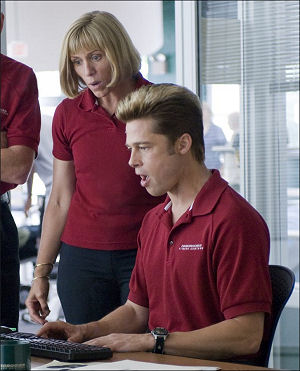Speed Racer opens seven days from now, and new tracking has it at 84, 26 and 3….obviously a weak number, although there’s no telling with family audiences. What Happens in Vegas is running at 80, 32 and 7 (with first-choice numbers among women being closer to 11 or 12). Chronicles of Narnia: Prince Caspian, which opens on May 16, is running at 96, 40 and 12 — pretty good. Indiana Jones and the Kingdom of the Crystal Skull (Paramount, 5.22) is through the roof, of course — right now at 89, 56 and 22.
Vegas
Presumably people are aware that What Happens in Vegas, the Cameron Diaz-Ashton Kutcher film (20th Century Fox, 5.8) that seems a little too chick-flicky for my tastes, is previewing nationwide tomorrow night. Not at 7 or 7:30 pm but at 9:30 or 10 pm, apparently. In some theatres, at least.
Be That Thing
Consider George Clooney‘s ceiling stare in this newly revealed still (lifted from Rope of Silicon) from the Coen Brothers’ Burn After Reading (Focus Features, 9.12). You can see in a second that he’s “playing” stupid. Only dumb buys look like George Romero zombies during post-coital meditation. You can pretty much gather what his performance will be from this one shot. I believe it’s very hard to play a dumb-ass as if you really are one, instead of just appearing to be pretending.
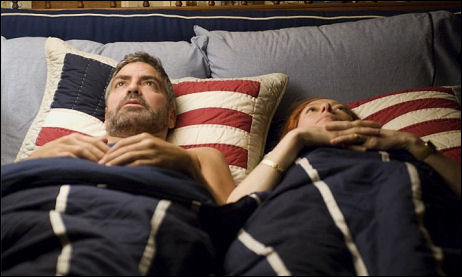
This is apparently the moment of discovery when Frances McDormand and Brad Pitt, playing health-club employees, realize they’ve gotten hold of a copy of some very hot memoirs from an ex-CIA guy (John Malkovbich). Big deal, right? Well, it seems that way because there hasn’t been a decent still selection from this film in months…ever.
The Hollowest
“Perhaps no vilifier of Hillary Clinton traipses across the footlights with a bigger satchel of calumnies than Andrew Sullivan, who diagnosed Mrs. Clinton as ‘the hollowest form of political life,’ a ‘sociopath.’ His solo act had and has a symptomatic significance. Published under the aegis of The Atlantic‘s stable of notable byliners, Sullivan’s Daily Dish blog is must-reading among the media elite, those sheep.
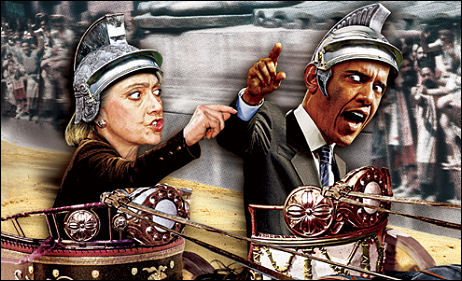
Wolcott’s anti-Sulllivan sympathies aside, the creator of this illustration, a guy named “Darrow,” is clearly anti-Hillary as he’s placed her in the position of Stephen Boyd‘s evil Messala and Barack Obama in the position of Charlton Heston‘s Judah Ben-Hur during the chariot race scene in William Wyler’s film.
“His words extend wider ripples in the ocean of emotion that passes for opinion journalism than did those of his fellow cobblers. In a column for The Times of London entitled ‘The Clintons, a Horror Film That Never Ends,’ Sullivan compared Hillary to Glenn Close‘s bunny boiler in Fatal Attraction — ‘Whoosh! She’s back at your throat’ — and the Clintons as a couple to the fast-running zombies in 28 Days Later. ‘The Clintons live off psychodrama,’ he contended in a classic pot-kettle-black moment.'” — from James Wolcott’s current (June 2008) online Vanity Fair column, titled “When Democrats Go Post-al.”
Adjustment
Indiana Jones and the Kingdom of the Crystal Skull (Paramount, 5.22) will actually show at the Cannes Film Festival on Sunday, 5.18, at 1 pm — not 8:30 am, as I wrote earlier. (The big film of the day is always shown at that hour.) And the press conference that will follow at 3 pm or thereabouts will be the only time, I’m being told, that director Steven Spielberg will give quotes about the film to general hoi-polloi press. (He’ s gotten on the phone with elite journos, of course, as he always does — Vanity Fair, etc.)
Uh-Oh…
David Gordon Green‘s Pineapple Express (Sony, 8.8) has been showing here and there, and a friend is telling me that aside from James Franco‘s career-changing performance as a stupid pot dealer, it’s a little coarse. It’s loud, “lots of mayhem,” youth-market-pandering, an “Abbott & Costello chase film,” full of explosions and “very, very violent,” he says. One comment was especially disturbing: “I’m not sure this is your kind of film.” What?, I said. I love smart stoner humor, I said. The Big Lebowski, Wonder Boys …that kind of thing. Guys with baked brains. It’s not on that level, he said. It’s louder, noisier…lots of explosions. Oh, I said. Well, there’s always Franco.
That aside, the friend said, the young audience he saw it with “ate it up…laughed at everything, even the women.” So it’s not for stoner sophisticates…fine. Basically an animal movie. Another Harold and Kumar thing except on a slightly higher level, a young girl said last night. “But it’s not Superbad,” my guy says. It’s not? “I don’t know what it is but David Gordon Green was never directed comedy before and….well, the violence is a much bigger factor than I expected.”
What about “episodic stoner segues,” I said? Side episodes in which they get all tangled up and confused over stuff that a normal person without pot issues would be able to handle but the stoners can’t because they’re too fried? “It’s not on that level,” he said. “It’s not as steeped in dry stoner humor as Lebowski is. It’s a little more pandering than that.”
Visions of Light
Another brilliant, perfectly-cut video piece from Jamie Stuart, and a good quote to go with it: “I’ve never been a big fan of ‘movie lighting’ (where exactly does rim light come from anyway?), although some filmmakers do it in a way that works for me.
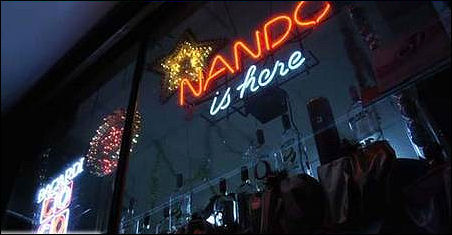
“Movie lighting — and, by extension, photography lighting — came about, in part, because film stocks in the past weren’t fast enough to shoot in low light levels. At the dawn of the medium, electric lights weren’t even bright enough, so the filmmakers created roofless sets that the sun could illuminate.
“Eventually, cameramen started to stylize their lighting and created a whole slew of affectations; it was exceedingly rare to see light fall in movies as it actually does in real life. Eventually, film stocks improved and filmmakers took their cameras out into the world from studios. Things changed.”
Here‘s the location of the original article.
Tweed-Jacket Kingsley
Vanity Fair Daily‘s Julian Sancton recently spoke to distinguished wackazoid actor Ben Kinglsey, who’s portraying yet another psychiatrist in Martin Scorsese‘s Shutter Island and, he says, playing it fairly straight and tweed-jackety. (The working title, he says, is Ash Cliff….terrible! Means nothing!)
Kingsley discusses his craft and his background as a classically trained Shakespearean interpreter. He’s a superb actor — one of the best — but don’t be fooled by such talk. Just as the Superman TV series in the 1950s taught us that George Reeves wore tights and could fly faster than a speeding bullet, Sexy Beast and his other nutter roles (You Kill Me, The Wackness, Lucky Number Sleven, Mrs. Harris, etc.) taught us that Kingsley is a raving loon under the skin. All that Gandhi and Turtle Diary and Betrayal stuff was a put-on. He was having us off!
“Elegy” Acquired
Isabel Coixet‘s Elegy, the Penelope Cruz-Ben Kingsley drama that debuted at the Berlin Film Festival, is going to be domestically distributed by Samuel Goldwyn Films and Sony Pictures Worldwide Acquisitions Group…whatever that means. Indiewire is reporting that Netflix’s Red Envelope Entertainment “is also on board for the release and will work to promote the film to their 7 million subscribers,” blah blah. Pic is based on Philip Roth‘s short novel The Dying Animal.

Presumably Elegy will be released domestically sometime this year.
Variety‘s Leslie Felperin gave Elegy a thumbs-up response. Key passage: “Scenes unfold in a series of near-musical dialogue duets, with Ben Kingsley offering finely-phrased arias of self-deprecation and despair. Despite the age difference, he and Penelope Cruz (who’s never been better in English) look somehow chemically balanced and credible as a couple in a way Nicole Kidman and Anthony Hopkins never did in The Human Stain.”
Fair Play for Towelhead
After seeing Alan Ball‘s Towelhead (formerly Nothing Is Private) in Toronto last September, I wrote that “there’s no question about it being smart, thoughtful and high-grade. It’s not 100% flawless (I had two or three speed-bump issues) but it’s certainly a sturdy, complex character drama that’s 100% deserving of respect. It’s obviously one of the most original, daring films about adolescent sexuality ever delivered by a quasi-mainstreamer. It’s also a sharp look at racism (and not just the American-bred kind) and a sobering portrait of the rifts and tensions between American and Middle-Eastern mindsets.”
Picturehouse Tumbling Down?
Somebody help me out here because this is weird. Warner Bros. has two dependent distribution arms, Warner Independent and Picturehouse, under its wing, and Defamer‘s Stu Van Airsdale is reporting that Picturehouse, seen by most veterans of the trench as the more shrewdly guided, successful and geared-up of the two, may soon be shut down? What?
A story posted this evening by Variety‘s Anne Thompson said that Picturehouse chief Bob Berney and Warner Independent prexy Polly Cohen are “likely” to accept a bicoastal power-sharing arrangement that will preside over a merged operation — Warner Indiepicturehouse.
“We have yet to hear where Berney will wind up,” Van Airsdale writes, “though a popular rumor has him sharing power at Warners’ other struggling boutique outpost, Warner Independent Pictures, with current WIP boss Polly Cohen.” I commented last night that this sounds like a post-Ides of March power-sharing deal between Octavian and Marc Antony. I’ve been told all along that Berney has been squeamish about the deal that Warner Bros. has wanted him to go with.
Van Airsdale has also reported another scenario with Berney “starting fresh at a new company underwritten with hedge fund cash, [which] would suit him well with Cannes on the horizon and Warners’ decreasing overall interest in the volatile indie marketplace. Warner Bros. would gladly get out anytime, but we hear they’re willing to move ahead with Berney if he’s interested.”
Jenkins’ Career Booster
Nobody can be called a near-lock for a Best Actor nomination at this stage of the game. With the start of awards season being a good four months away, it’s way too early to even speculate. Except, arguably, when it comes to Richard Jenkins‘ work in The Visitor. A quiet, heart-melting lead performance by one of the finest character actors in the business, Jenkins’ Walter Vale is one of those career-lifting roles that SAG members tend to warm to, remember and single out.
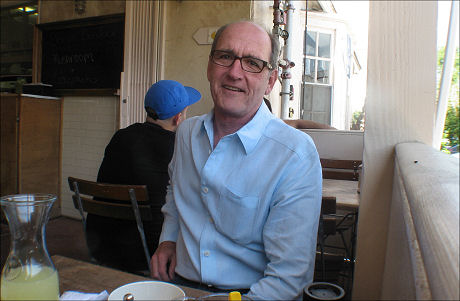
The Visitor star Richard Jenkins during today’s interview at West Hollywood’s Le Pain Quotidien — Thursday, 5.1.08, 1:45 pm
Especially when the actor in question has been stand-out superb in a long run of supporting roles over the last 20-plus years. For me Jenkins began to come into his own in the mid ’90s with two lawman parts — a police detective in Mike Nichols‘ Wolf (’94) and a gay FBI agent in David O. Russell‘s Flirting With Disaster (’96). I think Jenkins’ career took off with one scene in particular — when his agent reacts to a dose of LSD that’s been put into his food. It’s the single most hilarious drug-related scene in modern cinema.
That was twelve years ago, and for my money Jenkins has hit long doubles or triples with eight performances since, not counting his work in The Visitor. I’m thinking of the psychiatrist in There’s Something About Mary, the sheriff in Scott Hicks‘ Snow Falling on Cedars, some kind of offical or investigator in Sydney Pollack‘s Random Hearts, an EPA agent in Me, Myself & Irene, an aging racist murderer in am FX feature called Sins of the Father, a divorce attorney in Intolerable Cruelty, an uncredited but hilarious part in I Heart Huckabees, and 10 episodes as Nathaniel Fisher in HBO’s Six Feet Under.
The Visitor‘s Vale is a morose 50ish college professor who goes through a spiritual wake-up by helping out a couple of illegal immigrants, and then falling in love with the Palestinian mother of one of them, a young man who teaches him how to play a native drum.
His next three features are a British horror-thriller called The Broken, Adam McKay‘s comedic Step Brothers(Sony, 7.25) with Will Ferrell and John C. Reilly, and the Coen brothers‘ Burn After Reading (Focus, 9.12).
Jenkins is doing interviews to plug the recent theatrical expansion of The Visitor, which is now playing in some 300 situations. We met at lunch time at Le Pain Quotidien and spoke for over an hour. Here are two portions of that chat, totalling maybe 15 minutes — selection #1 and selection #2. We’re tallking about Burn After Reading as the first mp3 begins. We get into the Flirtiing LSD scene in the second portion.


